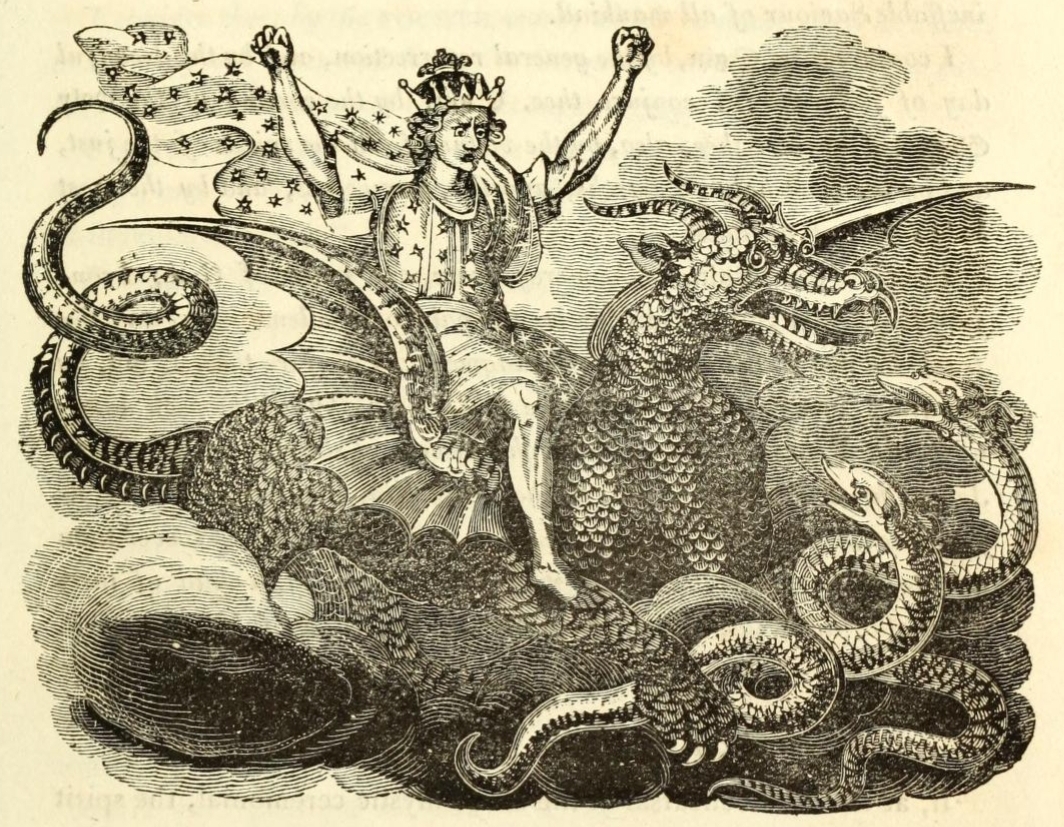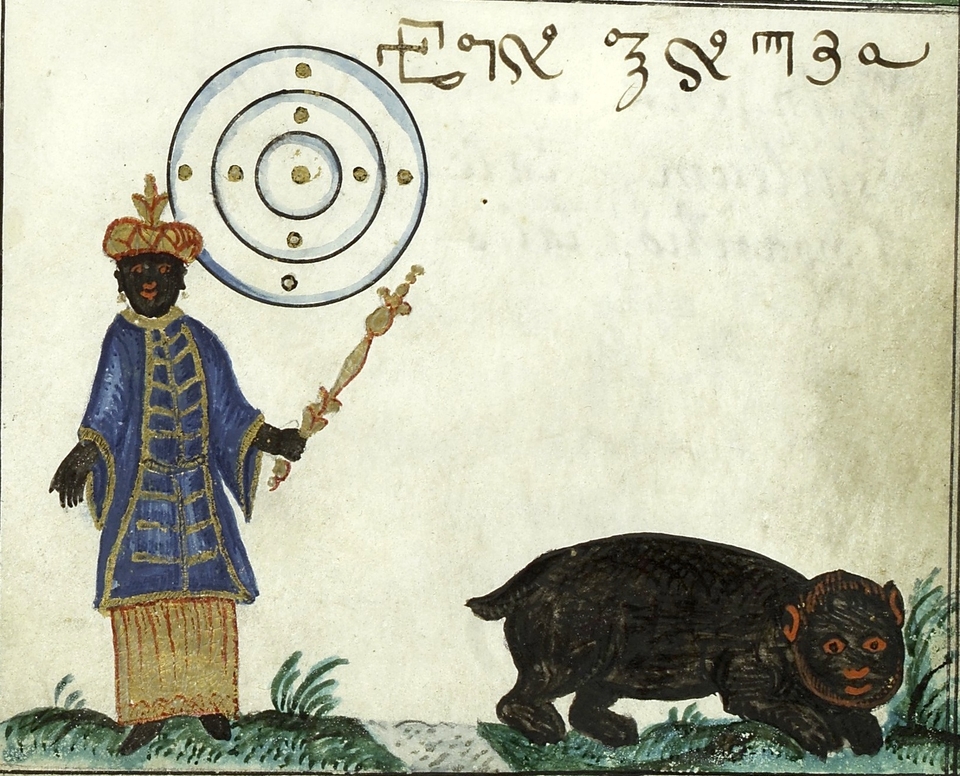Difference between revisions of "Egyn"
Occultwiki (talk | contribs) |
Occultwiki (talk | contribs) |
||
| (2 intermediate revisions by the same user not shown) | |||
| Line 1: | Line 1: | ||
[[File:AotNC Egin.jpg|thumb|right|"Egin", as depicted in ''The Astrologer of the Nineteenth Century'' by Robert Cross Smith]] | [[File:AotNC Egin.jpg|thumb|right|"Egin", as depicted in ''The Astrologer of the Nineteenth Century'' by [[Robert Cross Smith]]]] | ||
'''Egyn''' (also '''Egym''', '''Egin''', '''Egine''', '''Egyne''', '''Egione''', '''Egyon''', '''Equi''', '''Atiron''', and '''Mosacus''') is a [[demon]] king who is usually named in [[grimoire]]s alongside [[Oriens]], [[Amaymon]], and [[Paimon]] as kings of the cardinal directions. He is the king of the west. | '''Egyn''' (also '''Egym''', '''Egin''', '''Egine''', '''Egyne''', '''Egione''', '''Egyon''', '''Equi''', '''Atiron''', and '''Mosacus''') is a [[demon]] king who is usually named in [[grimoire]]s alongside [[Oriens]], [[Amaymon]], and [[Paimon]] as kings of the cardinal directions. He is the king of the west. | ||
==Etymology== | ==Etymology== | ||
In his notes on ''[[Book of Abramelin]]'', [[Samuel Liddell MacGregor Mathers]] offers etymologies for both names (Atiron and Egin), with the former being suggested as being either derived from the Hebrew root "orh", meaning to lay bare, or from the Greek word "arhreton", meaning secret or mysterious. The latter is suggested as being derived from the Hebrew "ogn", meaning to hinder, or from the Greek "aix" or "aigos" meaning goat. David Crowhurst in his ''Stella Daemonum'' offers an alternative etymology, suggesting that the name Equi may be derived from the Latin "equus", an alternative rendering of the constellation Pegasus in addition to being the word for "horse", and that the name Ariton may be derived from the name of Pegasus' sibling, Arion. | In his notes on ''[[Book of Abramelin]]'', [[Samuel Liddell MacGregor Mathers]] offers etymologies for both names (Atiron and Egin), with the former being suggested as being either derived from the Hebrew root "orh", meaning to lay bare, or from the Greek word "arhreton", meaning secret or mysterious. The latter is suggested as being derived from the Hebrew "ogn", meaning to hinder, or from the Greek "aix" or "aigos" meaning goat. David Crowhurst in his ''Stella Daemonum'' offers an alternative etymology, suggesting that the name Equi may be derived from the Latin "equus", an alternative rendering of the constellation Pegasus in addition to being the word for "horse", and that the name Ariton may be derived from the name of Pegasus' sibling, Arion. | ||
Several authors equate Egyn with the [[demon]] [[Mahazael]]. | |||
==Status and Rank== | ==Status and Rank== | ||
[[File:Egyn Clavis Inferni.jpg|350px|thumb|The demon Egyn as depicted in ''[[Clavis Inferni]]'']] | [[File:Egyn Clavis Inferni.jpg|350px|thumb|The demon Egyn as depicted in ''[[Clavis Inferni]]'']] | ||
Egyn appears as the king of the North in several | Egyn appears as the king of the North in several [[grimoire]]s, including the ''Book of Abramelin'', the ''[[Book of Oberon]]'', and ''The Grimoire of Saint Cyprian''. | ||
He is categorized as a former member of the order of [[Cherubim]] in ''MS Plut. 89 Sup. 38''. | He is categorized as a former member of the order of [[Cherubim]] in ''MS Plut. 89 Sup. 38''. | ||
Latest revision as of 04:27, 11 November 2024

Egyn (also Egym, Egin, Egine, Egyne, Egione, Egyon, Equi, Atiron, and Mosacus) is a demon king who is usually named in grimoires alongside Oriens, Amaymon, and Paimon as kings of the cardinal directions. He is the king of the west.
Etymology
In his notes on Book of Abramelin, Samuel Liddell MacGregor Mathers offers etymologies for both names (Atiron and Egin), with the former being suggested as being either derived from the Hebrew root "orh", meaning to lay bare, or from the Greek word "arhreton", meaning secret or mysterious. The latter is suggested as being derived from the Hebrew "ogn", meaning to hinder, or from the Greek "aix" or "aigos" meaning goat. David Crowhurst in his Stella Daemonum offers an alternative etymology, suggesting that the name Equi may be derived from the Latin "equus", an alternative rendering of the constellation Pegasus in addition to being the word for "horse", and that the name Ariton may be derived from the name of Pegasus' sibling, Arion.
Several authors equate Egyn with the demon Mahazael.
Status and Rank

Egyn appears as the king of the North in several grimoires, including the Book of Abramelin, the Book of Oberon, and The Grimoire of Saint Cyprian.
He is categorized as a former member of the order of Cherubim in MS Plut. 89 Sup. 38.
In the Book of Oberon he is said to have 12000 legions under his control in addition to having two messengers under his command named Rodabell and Lambricon, but MS Plut. 89 gives him 10000 legions. The Astrologer of the 19th Century simply gives him a "countless" number of legions.
Appearance
Egyn, with some variance between sources, appears as a king wearing a crown, riding a dragon, with fire coming out of his mouth and in some way accompanied by a pair of hissing serpents. His arrival is announced by loud noises and sweet instrumentals, and the sound of running water according to some sources.
Abilities
Egyn is described as being able to teach perfectly all physic, singing, the Notorary, Nigromantic, and Memoratory arts, talk about and work in various parts of the world, things past, present, an future, certain secrets, hidden things, the nature of earth, what it is, if the earth sustains the water or vice versa, the name of the Abyss and where it is, what the wind is and where it comes from, gives good familiars, dignities, and prelateships, consecrates books and other objects, gives true answers to all questions and demands, makes alterations to things, and can cause a man to win a variety of games.